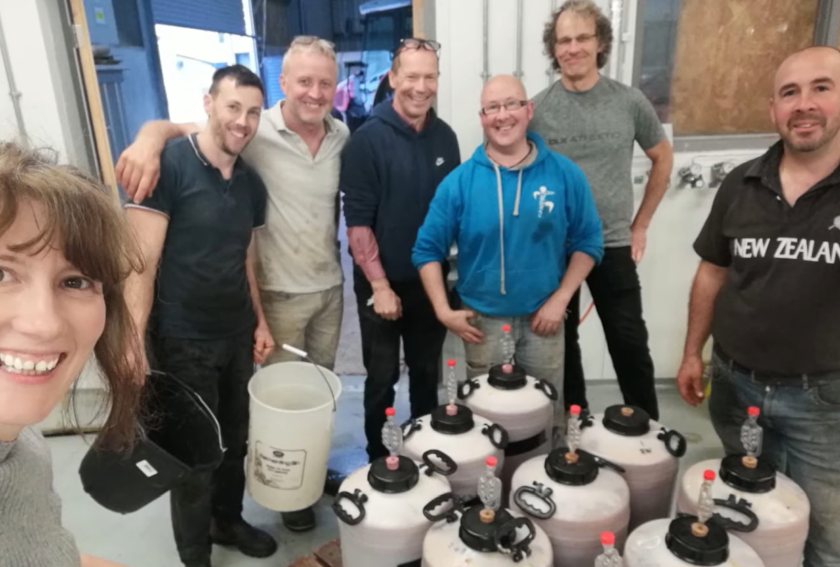'We are the cider-makers': Farmers build on success of eco-friendly business

A small group of entrepreneurial farmers are determined to build on the success of their eco-friendly cider business, set up at the very start of the pandemic.
For the group of five farmers, who live near Pisgah, a village in North Ceredigion, the sight of thousands of unpicked or windfall apples in local gardens at the end of every summer presented an opportunity to set up a new self-financing business.
The group organised their first major collection of apples in late summer 2020, which they then pressed into 1,000 bottles of ‘Seidr Pisgah Chi’, a traditional dry cider that completely sold out within just two weeks last year.
Last summer’s apples were picked in September, and are now fermenting in 30-litre barrels, in readiness for bottling this spring, and more apple trees and orchards have been planted, ready for the coming summer’s crop.
“Excitingly, this is a business ripe for further growth and development,” says Elen Pencwm, who supported the budding entrepreneurs through her role as a Farming Connect Agrisgôp leader.
Agrisgôp is one of Farming Connect’s most successful personal development programmes, which brings together like-minded farmers to progress business ideas.
In early 2019, two farming brothers, Sion and Rhodri Davies, had begun to sound out some of their farming friends about finding a new common interest, or setting up a new venture.
They all wanted to put their energies into a project that would excite and challenge them – something that would enable each of them to play to their own strengths, yet provide the opportunity to learn new skills too.
“We originally thought that just enjoying the experience of working together with a common aim would be sufficient reward, but thanks to Agrisgôp, considerable support from Aberystwyth University and an expanding number of loyal customers, we can all see the potential for growth,” says group member Dilwyn Williams.
Elen encouraged them to talk openly about their goals, and after sifting through a raft of ideas, the five farmers’ enthusiasm for the cider-making venture was unanimous.
The group met face to face quite a few times, before the pandemic restrictions forced them to switch to online meetings.
Specialist speakers also gave the farmers advice on issues, including picking and processing the apples, bottling, branding and social media marketing.
Elen also introduced them to Chris Charters, chair of the Welsh Cider & Perry Society, as well as plant breeder and geneticist Dr Danny Thorogood from Aberystwyth University’s Institute of Biological, Environmental and Rural Science (IBERS).
Dr Thorogood recently established a new heritage orchard set-up at the university’s Gogerddan campus, which will protect more than 60 rare fruits from extinction.
“Meeting Dr Thorogood and learning that as a community-based project, we could utilise the fruit-crushing and pressing facilities through the university’s Beacon Wales project until we were ready to invest in our own equipment, inspired us all,” said Mr Williams.
By autumn 2020, all five members had sought permission from the numerous growers where they had spotted unused apples; had devised a rota of ‘who goes where’, and were ready to spend a designated weekend picking and collecting the fruit.
Dilwyn said: “Although we have all got busy lives, we worked like trojans all that weekend, piling thousands of apples into crates, boxes and any large containers we could get our hands on, before we set off for Gogerddan early the following Monday in a convoy of vans, pick-up trucks, tractors and trailers – whatever means we had, basically."
Under the watchful eye of the Gogerddan experts, the group learned how to process, rack and bottle their new artisan cider. They also applied for an all-important alcohol licence.
By Christmas, they were ready to target pubs and restaurants, as well as locals keen to sample the new beverage.
They also had social media channels up and running ready to capitalise on the Christmas trade, and a professional photograph of the farmers, decked out in ‘turn of the century’ farm attire on the labels, touched a chord with delighted buyers.
Dilwyn added: “We are all determined to build on our success to date by sourcing more apples, making more cider and taking more orders.”








